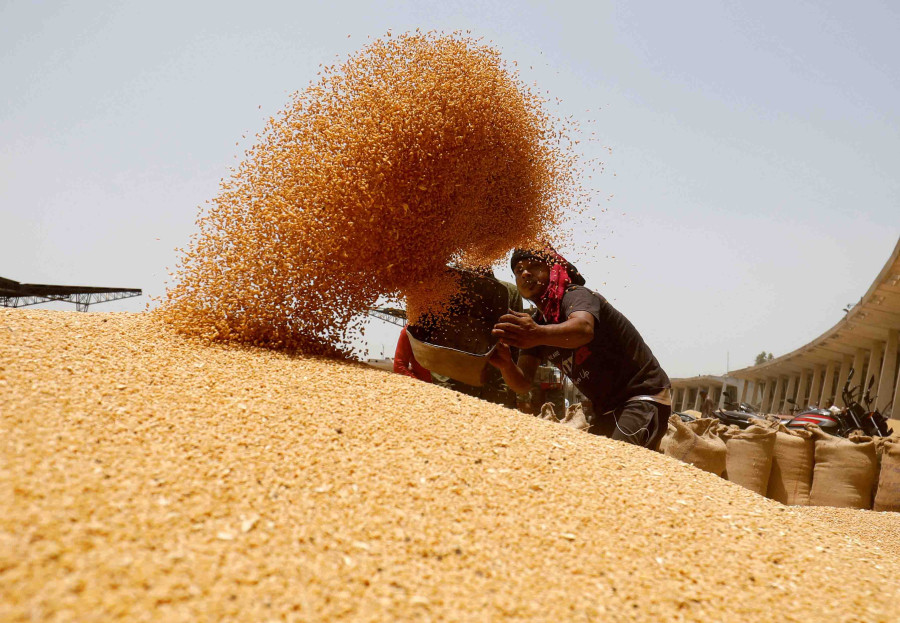Money
Flour mills hit as India controls wheat exports
Reduced shipments could result in a flour shortage in the market, and that may push up prices, traders say.
Krishana Prasain
Unnerved by India's introduction of export quotas for wheat, Nepali flour producers have urged the government to request the southern neighbour to increase the allocation for Nepal to stave off a possible price rise.
India has set a quota of 50,000 tonnes of wheat for Nepal, officials said.
According to Kumud Kumar Dugar, president of the Nepal Flour Mills Association, 33,000 tonnes out of the promised quantity will arrive within the next two weeks. “This amount will not resolve the problem.”
Reduced shipments could result in a flour shortage in the market, and that may push up prices, traders say.
According to the Ministry of Industry, Commerce and Supplies, the remaining 17,000 tonnes of wheat has to be imported by March 31.
Last May, India imposed a ban on wheat exports after unseasonably hot weather hurt the wheat crop, sending local prices soaring besides causing food security risks to India.
The price of flour increased after India restricted exports.
The Industry Ministry published a notice on August 8 last year requesting sugar and flour producers to submit paperwork to apply for quotas. The Indian government has also imposed a quota system on sugar.
Before India slapped controls on wheat shipments, a 50-kg bag of refined flour used to cost Rs3,200 to Rs3,300. After the ban, the price jumped to Rs5,000. The retail price is almost double that, traders said.
India imposed the quota system for its neighbours in December. By January, wheat stocks at government warehouses had plunged by 47.9 percent to 17.2 million tonnes, a six-year monthly low.
According to a Reuters report, India is considering extending the ban on wheat exports as the world's second biggest producer seeks to replenish state reserves and bring down domestic prices.
The existing ban was scheduled to be reviewed in April and top government officials from the food, farm and trade ministries are likely to make a decision on an extension by the end of March, or early April, according to Reuters.
The Indian government is unwilling to open wheat exports until mid-2024, the report said.
According to Dugar, Nepal requires 200,000 tonnes of wheat before the new harvest starts reaching the market. “We have written to the Industry Ministry about the problem,” Dugar said.
Last Friday, Nepali flour producers met with Industry Minister Damodar Bhandari and requested him to start the process to import wheat out of quota.
Narayan Prasad Regmi, spokesperson for the Industry Ministry said he was not aware of the issue.
Urmila KC, under secretary of the ministry, too, said she had no knowledge about the matter.
The Indian decision to cut wheat shipments has worried Nepali manufacturers of biscuits, noodles, bread and bakery products.
The Indian Embassy in Nepal has informed Nepali flour manufacturers that it will provide a quota of 50,000 tonnes of wheat as requested earlier.
According to the association, 26 flour mills had applied to get wheat quotas through the Industry Ministry, and 12 mills were turned away.
“This is not the solution,” said flour traders.
Kathmandu consumes 2,100 tonnes of flour daily, 80 percent of it refined flour and 20 percent wheat flour, the association said.
The association has a membership of 38 flour mills. The flour mills supply refined flour to makers of biscuits, noodles, bread and other products.
The export ban has forced 80-85 percent of Nepali flour mills to shut down, the association said.
“As wheat shipments are starting to arrive, some flour mills are planning to resume operations,” said Dugar, owner of Bikash Food Products which produces Gyan brand flour. “We will be reopening the factory on Sunday.”
Dugar said they had been operating at 30 percent of capacity and eventually shut down for a week after running out of wheat. He added that 50,000 tonnes of wheat would keep the flour mills running for 15 days.
“There is a need for government-to-government talks to have the ban lifted, especially for Nepal as the market here is not so big,” said flour traders.
In the last fiscal year 2021-22, the wheat harvest increased by less than 1 percent to 2.02 million tonnes, as per the Ministry of Agriculture and Livestock Development.
Wheat, the country’s third largest cereal crop, is sowed in mid-November and harvested in mid-April. Nepal witnessed a wheat output of 1.97 million tonnes in 2014-15.
Production plunged 12.1 percent to a six-year low of 1.73 million tonnes in 2015-16 due to a winter drought.
Harvests increased by 6 percent in 2016-17, reaching 1.84 million tonnes. The country’s wheat production stood at a record 1.94 million tonnes in 2017-18 despite a prolonged winter drought.
In 2018-19, output swelled to 2.08 million tonnes; and in 2019-20, the harvest reached an all-time high of 2.18 million tonnes, according to the ministry's statistics.
In 2020-21, the drought caused the wheat output to fall by 8 percent to 2 million tonnes.
Nepali traders say they import wheat mainly from India as the price is lower than in other countries.
Due to the Indian restriction on shipments, wheat imports dropped by 98 percent to 1,895 tonnes in the first six months of the current fiscal year ended mid-January, according to the Department of Customs.




 20.12°C Kathmandu
20.12°C Kathmandu














